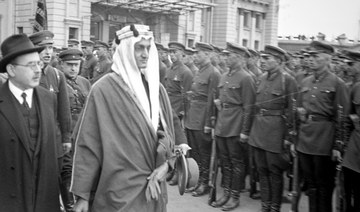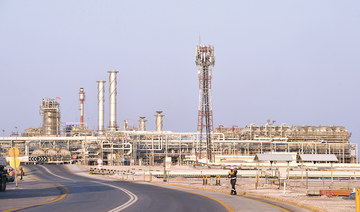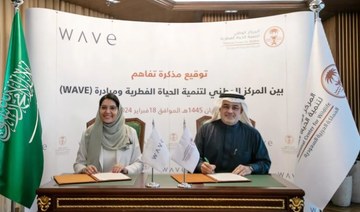MOSCOW: Archaeology in Saudi Arabia has seen an unprecedented number of discoveries and findings in recent years. With over 44 Saudi and international missions working in the Kingdom this year alone, Russia’s State Hermitage Museum director, Mikhail Piotrovsky, commended the country’s efforts in presenting its hidden treasures to the world.
Arab News met with the director in Moscow to discuss the future of archaeology in Saudi Arabia and his interest in hosting one of its most famous exhibits, “AlUla: Wonder of Arabia.”
Piotrovsky, the urbane general director of the State Hermitage Museum located in Saint Petersburg, was appointed in 1992 by decree of the prime minister at the time.
He has a long history with the museum.
He took up the position following his father, Boris Piotrovsky, who was director from 1964 until his death in 1990.
Piotrovsky’s work at the museum is inspired by both his passion for the arts and a deeply rooted adoration for archaeology.
A graduate of Leningrad University, he spent a year taking part in archaeological explorations in Yemen, the Caucuses and central Asia, with over 200 scholarly publications, including catalogues of Arabic manuscripts.
A fluent Arabic speaker, he dedicated many years of his career to the archaeology of the Arab world, the spiritual and political history of Islam and Arab culture as well as medieval works and ancient inscriptions.
He told Arab News how the school of archaeology is always developing, and in order to achieve success in any excursion, it is key that teams coordinate with others to learn from their experiences.
“It is a very international field. If it is not, it will become too narrow and nationalistic,” Piotrovsky said.
“Archaeological departments are the most open bodies in every country. Be it Russia, Egypt, Iraq or Saudi Arabia, they are accustomed to working with different points of view and people from other civilizations. Openness is important for achieving success.”
The director said that many archaeologists from the Kingdom have been invited by the museum to partake in expeditions alongside Russian archaeologists to gain experience and exchange knowledge.
“AlUla is one of the jewels of archaeology,” he said. “It is a rare site, the Nabataeans controlled the routes from south to north. The Romans, Indians, ancient Palmyrians and Bedouins have been there.” The director told Arab News that they have been working in joint teams not only in archaeological diggings but also with plans to develop what they call an “archaeological park.”
NUMBER
4.5m - people visited the State Hermitage Museum.
The Russian State Hermitage Museum tells the story of Russia, its palaces, Peter the Great and many more significant historical moments. The museum also exhibits artifacts of different civilizations: Islamic, Buddhist, Catholic and others.
The museum’s message and goal is for “different civilizations to speak to each other and to us and make a connection,” he exclaimed.
Piotrovsky believes the same concept can be developed for AlUla.
Speaking to Arab News last January, Dr. Abdullah Al-Zahrani, general director of archaeological research studies at the Saudi Commission for Tourism and National Heritage, said that digs in Saudi Arabia are increasing at an unprecedented rate.
“Archaeology in the Kingdom is on the rise,” said the director.
“There is still a lot to be discovered and we are still in the period where you begin to dig and make a discovery, dig more and make another discovery. In the Arab world, everything is new and holds a base for the development of knowledge.”
Piotrovsky has been following the progress of archaeology in the Arab world for many years and he said that more archaeologists are going to Saudi Arabia now than at any point in the past 10 years.
Antiquities discovered in the Kingdom are known to come from one of the oldest areas of human settlements, with discoveries dating back 1.2 million years. In this past year alone, 15 new sites were discovered across the country.
FASTFACT
85,000-year-old discovery of a rare fossilized finger bone in the Nefud Desert is the oldest human fossil on record unearthed.
“It is a very important region which is still undiscovered properly. We all know the first man, according to our theories, was born in Africa and then we see its traces moving to Europe and Asia through the Arabian Peninsula,” said Piotrovsky.
“Ancient archaeology is very important but I think for this time period it should be the archaeology of the written period. Archaeology of the trade routes, coming from India and Africa, trade routes from Iraq and Palestine and Syria. There were fantastic kingdoms and sites.”
The museum’s keen interest in Saudi Arabia’s archaeological findings are a reflection of the director’s move to enhance cooperation between the countries.
It is planning on bringing the Kingdom’s first international exhibition dedicated to the human and natural heritage of AlUla titled “AlUla: Wonder of Arabia” to Saint Petersburg.
In 2011, the museum hosted the third leg of the “Saudi Archaeological Masterpieces through the Ages” exhibition after the successful exhibitions at the Louvre Museum in Paris and the La Caixa Foundation in Barcelona.
Aimed to introduce the historical and cultural importance of the Kingdom, the 450 relics were displayed for the first time outside of Saudi Arabia. They date back to a time between the Palaeolithic era and the pre-Islamic ages.
Since the launch of the Vision 2030 reform plans, many steps have been taken to present Saudi Arabia’s modern culture and ancient wonders to the world.
There is history lying beneath the Kingdom’s vast sand dunes, and a dig will not suffice, there is more to be done for the world to connect with the Kingdom.
“Opening up to the world is a little bit dangerous, but a museum recipe is a good one,” said Piotrovsky.



































